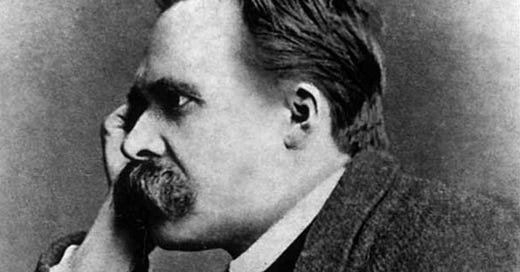Friedrich Nietzsche (1844 - 1900) was one of the most profound and radical thinkers of modern philosophy. One of his most famous quotes is, That which does not kill us makes us stronger. Nietzsche, himself, faced severe and debilitating medical problems throughout his life. Health struggles deeply influenced his philosophical work. His story is one of intellectual brilliance combined with physical and mental suffering. He experienced severe migraines and eyesight problems in his twenties; conditions which became more acute with age. His migraines were often accompanied by intense nausea and vomiting, preventing him working for days at a time. His sight problems were so severe that he had difficulty reading and writing. This led him to rely on scribes to complete his work. His genius, I believe, is all the more impressive for this.
I discovered Nietzsche in my 20s. Fascinated by this dark, quirky, 19th Century, German philosopher, three of his quotes particularly shaped my thinking.
The individual has always had to struggle to keep from being overwhelmed by the tribe.
Nietzsche was deeply critical of herd mentality and the suppression of individuality by societal norms. In Thus Spoke Zarathustra, he explored the tension between the individual and the collective. He believed that most people conform to the values and beliefs of the masses, losing their sense of self. He advocated for the individual to break away from the constraints of the tribe and to embrace self-discovery.
I have benefited from being part of a middle class tribe, in a safe, democratic country. My working life has been within the protective walls of large corporations. However, I have become increasingly aware of the madness of groupthink, e.g. politically motivated projects and bureaucratic processes. In some small way, this blog and the apps I develop are vehicles for a bit of escapism and self-discovery.
In every real man, a child is hidden that wants to play.
This line from Thus Spoke Zarathustra reflects Nietzsche's belief in creativity, spontaneity and the vital role of play. He believed that true creativity and freedom come from reconnecting with the playful, childlike aspects of ourselves. This contrasts with the seriousness and rigidity of adult life which often stifles lateral thinking and individuality.
For me, humour and play are great sources of pleasure and inspiration. One of the most rewarding jobs I did was corporate strategy for an FT100 company. I worked with some hugely talented people who worked hard and enjoyed themselves. My boss, Andy, had a framed picture of his baby boy on his desk. One of the company directors was chatting with Andy and noticed the picture. Is that your son?, the director enquired. Yes, it is, Andy said, proudly. On closer inspection of the picture, the director found himself looking at his own face. Nice picture, said the director then quickly moved on. Unbeknown to Andy, my colleagues and I had stuck a picture of the director over the baby’s face.
There are no facts, only interpretations.
In this quote from Beyond Good and Evil, Nietzsche encapsulates the idea that all knowledge and truth depend on individual perspectives. Objective reality is inaccessible to us and what we perceive as truth is a product of our interpretations shaped by our cultural and personal biases. This questions the validity of universal truths.
I believe that our perception of the world is a mental construction rather than a direct experience of reality. Our brains predict and create a version of the world based on past experiences, generating a kind of hallucination that we perceive as reality. We live inside a mental reconstruction of the world, not in reality itself, because we have no direct access to the true nature of things. As Einstein said, Reality is merely an illusion, albeit a very persistent one. I hope this makes me a more humble person and not so hung up on dogmatic views. I’m sure my wife will remind me of this, next time I open my mouth.
Other resources
My Love of Friedrich Nietzsche talk by Robert Greene
People Who Help Me Find Strength in Adversity post by Phil Martin
What a Roman Emperor Taught Me post by Phil Martin
I feel Nietzsche should have the last word. The higher we soar, the smaller we appear to those who cannot fly.
Have fun.
Phil…




